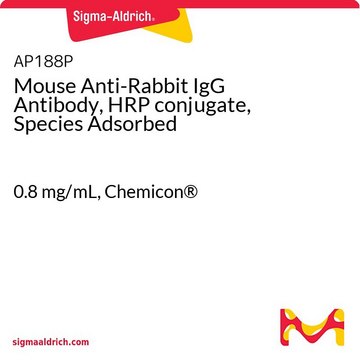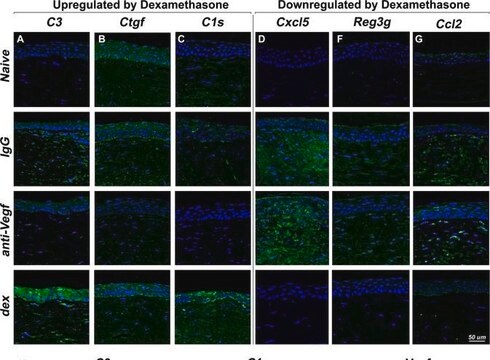AP187P
Goat Anti-Rabbit IgG Antibody, HRP conjugate, Species Adsorbed
0.8 mg/mL, Chemicon®
Synonym(s):
Goat Anti-Rabbit IgG
About This Item
biological source
goat
Quality Level
conjugate
peroxidase conjugate
antibody form
F(ab′)2 fragment of affinity isolated antibody
antibody product type
secondary antibodies
clone
polyclonal
species reactivity
rabbit
manufacturer/tradename
Chemicon®
concentration
0.8 mg/mL
technique(s)
ELISA: suitable
western blot: suitable
shipped in
wet ice
target post-translational modification
unmodified
Specificity
Application
Secondary & Control Antibodies
Secondary Antibodies Adsorbed for Dual Labeling
1:500-1:5,000 for Immunoohistochemistry on tissue sections.
1:5,000-1:100,000 for ELISA and Western blotting with chromogenic substrates.
1:10,000-1:200,000 for western blotting with chemiluminescent substrates.
Optimal working dilutions must be determined by the end user.
Physical form
RECONSTITUTION:
Reconstitute with 1.5 mL sterile distilled water.
Storage and Stability
Legal Information
Disclaimer
Not finding the right product?
Try our Product Selector Tool.
Signal Word
Warning
Hazard Statements
Precautionary Statements
Hazard Classifications
Eye Irrit. 2 - Skin Irrit. 2
Storage Class Code
11 - Combustible Solids
WGK
WGK 3
Flash Point(F)
Not applicable
Flash Point(C)
Not applicable
Certificates of Analysis (COA)
Search for Certificates of Analysis (COA) by entering the products Lot/Batch Number. Lot and Batch Numbers can be found on a product’s label following the words ‘Lot’ or ‘Batch’.
Already Own This Product?
Find documentation for the products that you have recently purchased in the Document Library.
Customers Also Viewed
Our team of scientists has experience in all areas of research including Life Science, Material Science, Chemical Synthesis, Chromatography, Analytical and many others.
Contact Technical Service







